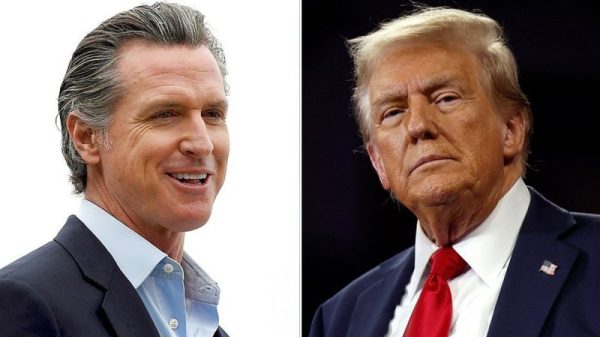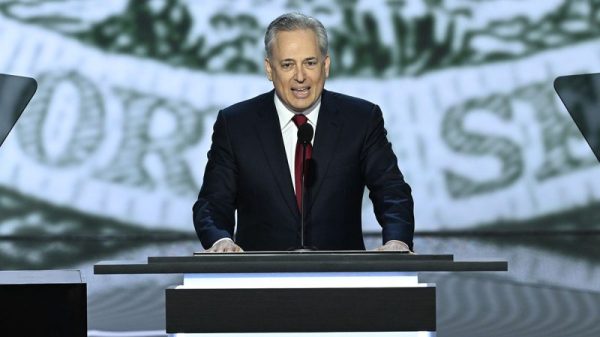The day after JD Vance was elected to the U.S. Senate in 2022, he received a congratulatory text from Charles Johnson, a blogger and entrepreneur who has zealously promoted right-wing conspiracy theories.
Johnson assumed the posture of a wise mentor, cautioning the first-time officeholder to choose his staff carefully and repeatedly pressing him on his committee assignments. “Got to keep you out of trouble,” wrote Johnson, who now describes himself as a government informant seeking to protect the United States from foreign influence.
Their correspondence over the next 20 months — extending into the weeks before former president Donald Trump picked Vance as his running mate — offers a glimpse of the Republican vice-presidential nominee’s off-the-cuff musings, often matching his public expressions but voiced with much less polish. Vance was just as casual in discussing America’s foreign alliances as he was in evaluating his own private alliances with the GOP’s moneyed class. With Johnson, he pondered responsibility for the sabotage of the Nord Stream gas pipelines and crudely described his aversion to the Ukrainian government and refusal to consider its pleas for U.S. assistance.
“Dude I won’t even take calls from Ukraine,” he told Johnson in October, about three weeks after House Republicans blocked additional aid to help Kyiv repel the Russian invasion. “Two very senior guys reached out to me. The head of their intel. The head of the Air Force. Bitching about F16s.”
In response to questions about his correspondence with Johnson, Vance spokesman William Martin said the two were never close and don’t share the same politics. “Chuck Johnson spam texted JD Vance,” Martin said. “JD usually ignored him, but occasionally responded to push back against things he said.”
The texts, sent over the encrypted messaging app Signal and provided by Johnson to The Washington Post, show the 40-year-old senator engaged in the kind of freewheeling communication ordinarily tightly controlled by congressional staff.
As a newly minted senator, Vance solicited Johnson’s views on many topics, including UFOs (“What is your read”), the Republican Party’s relationship with Israeli Prime Minister Benjamin Netanyahu (“What is GOP Bibi problem?”) and the death of convicted sex offender Jeffrey Epstein (“Do you think Epstein actually killed himself?”). When Johnson suggested that the senator should work to restrict foreign ownership of U.S. housing, Vance responded with a “thumbs up” emoji.
The mostly friendly conversation with Johnson reflects how Vance gravitates to people on the political fringe — a cohort emboldened by Trump’s insurgent campaign in 2016 and highly active online in the years since. After Trump picked Vance as his running mate on July 15, Johnson has been criticizing his onetime interlocutor and threatening to release their communications. He said he has grown disillusioned with Vance, especially over the senator’s favorable view of the Israeli prime minister, and now supports President Biden and Vice President Harris, the Democratic presidential nominee.
Johnson has spread fantastical claims about a wide range of politicians and journalists and has made comments casting doubt on the Holocaust. He was banned from Twitter in 2015 for soliciting donations aimed at “taking out” Black Lives Matter activist DeRay Mckesson. He argued at the time that he was referring to journalistic sleuthing, and his account was restored under the platform’s new owner, Elon Musk.
Johnson has provided information to the FBI in recent years about some of his associates and maintains that his access to far-right circles has allowed him to expose wrongdoing and serve the public good, saying, “My admittedly controversial associations have allowed me to get entry to some of the most fringe spaces, but my commitment to our country hasn’t wavered.”
Vance is perhaps the most high-profile emblem of a new breed of conservative politician willing to entertain and endorse provocative or offensive figures. Trump has displayed similar impulses, including in 2022 when he dined at his Mar-a-Lago Club with Nick Fuentes, an outspoken Holocaust denier.
Unlike Trump, however, Vance has turned his ideological permissiveness into a political philosophy — an open embrace of the unvetted and the indecent aimed at undermining conventional norms of truth and decorum. Vance has defended his vision as a big tent representing how many Americans actually think. Democrats have described his approach as “weird,” a label that Harris allies have increasingly applied to the Trump ticket.
Vance has bragged about being “plugged into a lot of weird, right-wing subcultures.” He wrote a positive blurb for a book by Jack Posobiec, the far-right activist who advanced the “Pizzagate” conspiracy theory. And he has defended Alex Jones, the right-wing radio host who spread lies about the Sandy Hook school shooting.
“Believing crazy things is not the mark of whether somebody should be rejected,” Vance said in a 2021 speech to the conservative Teneo Network that was recently published by ProPublica. “Believing important truths should be the mark of whether we accept somebody, and if they believe some crazy things on the side, that’s fine. We need to be okay with nonconventional people.”
In the texts, Vance often seemed skeptical of Johnson — not because of his associations with far-right causes but rather because of his self-presentation as a spook. “If you are who you say you are then don’t you have my phone tapped?” Vance wrote last fall, adding an emoji signaling that he was laughing so hard he was crying.
Still, the messages suggest Vance valued Johnson’s opinions. The two were introduced over email in 2019 by a Republican fundraiser, according to correspondence shared with The Post, but Johnson, who helped start the facial recognition company Clearview AI, said they had spoken previously. Though their conversation was generally amicable, they argued about Israel in the messages. Vance pushed back on Johnson’s criticism of Netanyahu, falsely characterizing some of the prime minister’s past positions.
“If the GOP listened to Bibi we wouldn’t have invaded Iraq, wouldn’t have done nation building in Afghanistan, and wouldn’t be threatening a war with Iran,” he wrote. In fact, Netanyahu supported the U.S. invasion of Iraq and had pushed for regime change in Iran, telling Congress in 2002, “It’s not a question of whether Iraq’s regime should be taken out but when should it be taken out; it’s not a question of whether you’d like to see a regime change in Iran but how to achieve it.”
Vance said he thought more of Netanyahu’s government than of Americans who support interventionist foreign policy. “Publicly and privately not a single rep of the Israeli government has sounded as insane as our neocons,” he wrote.
His defense of Israel and scorn for neoconservatives shows Vance saying privately what he often says publicly. But he let his guard down with Johnson, responding to the suggestion that he read an article about the influence of Sheldon Adelson, the late Republican megadonor, by saying, “I’m pretty sure he gave me shit.”
“Never met him,” Vance wrote last year. “Hes dead. Don’t care.”
Adelson died in January 2021, months before Vance entered the race for U.S. Senate in Ohio. But his widow, Miriam Adelson, contributed $2,900 to Vance’s campaign, federal records show, and she recently gave $5 million to a pro-Trump super PAC, with promises to contribute more this year.
A spokesman for the Adelson family, Andy Abboud, said Miriam Adelson spoke Monday to Vance following a Post inquiry about the senator’s message to Johnson. “She is unfazed,” Abboud said. “She will continue to have a good relationship with JD Vance.”
In the messages, Vance pushed back on Johnson’s accusations that he was beholden to donors and other allies, including his law school mentor, Yale professor Amy Chua. When Johnson suggested that Vance was channeling Chinese and Israeli interests, Vance replied, “Chua doesn’t tell me anything.” He added: “I am pretty sure I don’t even know another Chinese american.” Chua declined to comment.
At times, the conversation was one-sided, with Johnson repeatedly texting Vance his social media posts without eliciting any response. Late last year, they argued after Johnson challenged Vance’s criticism of the sale of U.S. Steel to a Japanese corporation. “Stop sending me weird messages,” Vance told Johnson. “I find your threatening tone enraging.”
But occasionally, Vance took the initiative with Johnson, reaching out last fall to ridicule the mental state of a pro-Ukraine activist. In a nod to Johnson’s purported work for the U.S. government, Vance suggested he should “have the spooks up the doses of Xanax among the rank and file,” an insinuation that Washington was engineering popular support for Ukraine. The following month, he asked for Johnson’s take on a former intelligence official’s claims that the U.S. government had evidence of alien spacecraft.
In response to a tweet Johnson sent him about Epstein’s death, Vance asked whether he thought it was a suicide, as New York City’s medical examiner concluded, and added of the sex offender: “Also haven’t followed story closely but he seemed like a genuinely bad dude.”
On June 24, as several media outlets reported that Vance was among Trump’s top choices for vice president, Johnson wrote to him: “Congratulations. Good luck.”
Vance responded six days later. “For what?” he asked. “You assume too much!”
Johnson warned: “Don’t take it when it’s offered. It’s a trap.”
“Haha,” Vance wrote back. “Doubt it’s offered. We’ll see.”
On July 15, the day Trump announced his selection, Johnson sent Vance a message: “Lots of reporters asking into you.”
Aaron Schaffer contributed to this report.


































